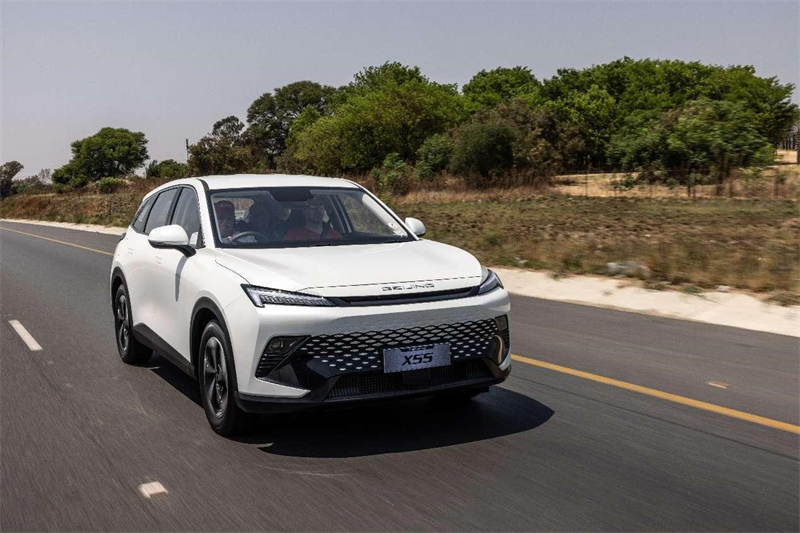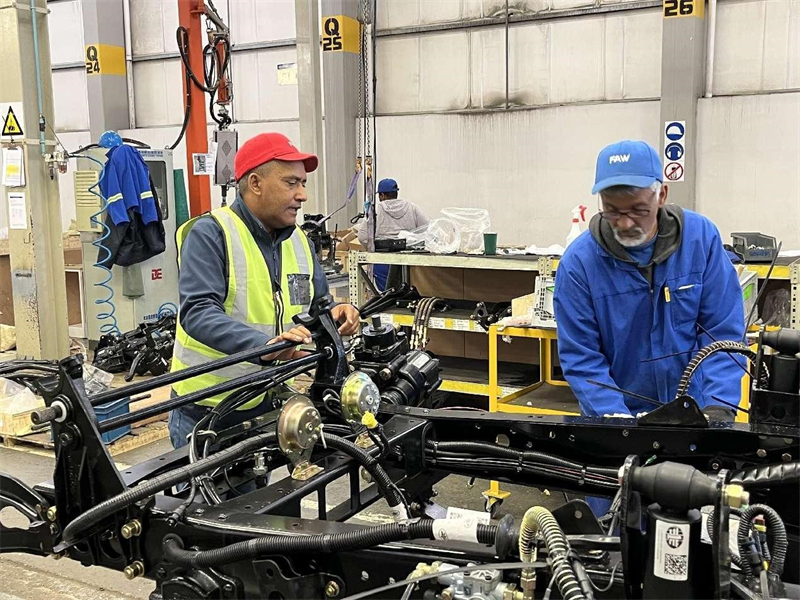China, South Africa see broad cooperation prospects in automotive industry
More and more Chinese cars are appearing on the streets of South Africa, such as Haval series of Great Wall Motors (GWM), Rubik's Cube of Beijing Automotive Group Co., Ltd. (BAIC) and Tiggo 5X of Chery.
According to recent statistics released by the National Association of Automobile Manufacturers of South Africa, the cumulative sales of Chinese vehicles in South Africa exceeded 22,000 units in the first three quarters of 2023. Currently, two Chinese car brands rank among the top 10 in the country in terms of sales volume.
South Africa is the largest automotive market in Africa. An insider said that Chinese vehicles offer good value and provide local consumers with more choices.

A vehicle manufactured by a Chinese automaker runs on a highway in South Africa. [People's Daily/Zou Song]
More Chinese automakers are investing in South Africa, establishing factories, and gradually gaining a foothold, contributing to the overall rapid development of the South African automotive industry.
"Three generations of my family are owners of GWM vehicles, from sedans to pickups and to SUVs. We are loyal fans of Chinese vehicles," said Thomas Walkford from South Africa.
"The GWM vehicles offer perfect durability and comfort, with a remarkable advancement in technological features. The performance of my recently purchased Haval H6 is beyond all my expectations," Walkford noted.
"That's awesome! This car has an interior design inspired by an aircraft cockpit, with hidden door handles and distinctive headlight design that makes it easily recognizable on the streets," said a young South African named Elvin, who's a fan of the BAIC Senova X55, which was honored as the Compact Family Car of the Year in South Africa last year.
In 2023, Chinese vehicles have consistently received accolades in the South African Car of the Year Awards and the Festival of Motoring in Johannesburg. During the 15th BRICS Summit held in Johannesburg last year, models of Chinese brands such as GWM, BAIC, and Chery were chosen as official vehicles.
In recent years, the overall quality of Chinese automobiles has significantly improved, leading to increased acceptance among South African consumers.
Andlye Durmanzwini, a South African car dealer, said African consumers value good performance and low fuel consumption, reliability, as well as comprehensive after-sales services and easily accessible spare parts.
"It is rare that most Chinese brands possess all of these characteristics," he said.
In 2023, an off-road pickup truck of GWM won the "best pickup of the year" award in South Africa. Li Qiang, general manager of GWM South Africa, noted that Chinese automotive brands are increasingly focusing on product quality, emphasizing vehicle features and suitability, which is a key reason for gaining trust from local consumers.
Chinese commercial vehicles are also favored in the South African market. Larry Tao, who drives a medium-sized bus in Johannesburg, bought a vehicle manufactured by BAIC Foton five years ago.
"This Chinese vehicle was reasonably priced, has sufficient power and low fuel consumption, and performs well on uphill and downhill terrains. The passengers are also very satisfied with it," Tao said, adding that he has recommended Chinese vehicles to fellow drivers.

Local employees assemble vehicles in a workshop of the Coega assembly plant of Chinese automaker FAW in South Africa. [People's Daily/Zou Song]
By the first half of 2023, the Coega assembly plant of Chinese automaker FAW in South Africa had sold over 15,000 trucks, and secured the largest share in the South African truck market in the first quarter.
Hiraaz Kalman, who owns a transportation company that operates freight services between South Africa and Mozambique, said that FAW trucks are covered by special paints so that they can adapt to the humid coastal climate, resulting in durable bodies and higher resale value.
In the facility of BAIC in South Africa's Coega Special Economic Zone, multiple batches of local employees have become proficient in the production process under the guidance of Chinese workers.
This facility is the first overseas vehicle production plant of BAIC. With a total investment of $226 million, it aims to become a global production and export base focusing on South Africa and radiating Africa, Europe, the Middle East, Latin America, and other regions.
Over the past seven years, it has directly or indirectly created over 3,000 jobs and benefited more than 150 local small- and medium-sized enterprises through subcontracting.
Farhana Paruk, a senior executive at the Gordon Institute of Business Science at the University of Pretoria in South Africa, noted that Chinese automotive investments in South Africa have effectively stimulated local employment. Additionally, Chinese vehicles are better suited to the market, leading to an increase in brand value.
The rapid development of the Chinese automotive industry, particularly in the field of electric vehicles, offers valuable lessons for the South African automotive sector to learn from, she added.
Paul Zilungisele Tembe, a senior researcher with the Thabo Mbeki African Leadership Institute at the University of South Africa, said that South Africa has a relatively well-established foundation and marketing network of the automotive industry, and is actively attracting foreign investments to achieve industrial upgrading.
Chinese automotive brands can leverage the South African market to expand their presence in more regions globally, leading to mutual benefits and win-win outcomes, he noted.
























